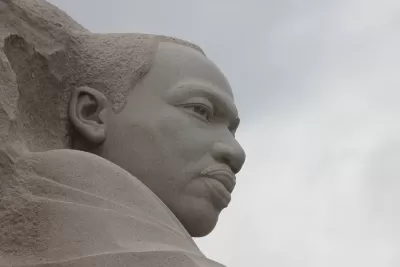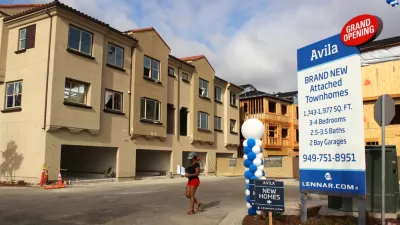Fifty years ago today, participants in the March on Washington were seeking to narrow the economic gap between America's blacks and whites. After five decades, that gulf remains. Vauhini Vara explains how homeownership is partly to blame.

While the gap in median income for black households compared to white households narrowed slightly (from 55% to 59%) between 1967 and 2011, according to Census data analyzed by the Pew Research Center, the gap in household wealth (everything a family owns) has actually grown over time, writes Vara. "Pew found that the median black household had about seven per cent of the wealth of its white counterpart in 2011, down from nine per cent in 1984, when a Census survey first began tracking this sort of data."
"[T]he wealth gap," he explains, "mostly comes down to home ownership. Researchers at Brandeis University recently tracked the same group of black and white families from 1984 to 2009. During that period, a smaller proportion of black families bought homes, and those who did bought them later in life than their white peers—and that meant they benefited less as home values rose, according to Thomas Shapiro, a professor at Brandeis University."
While Lyndon B. Johnson's War on Poverty, the Civil Rights Act of 1964, and subsequent policies were successful in helping "people find good work and make decent wages," Vara argues that the government should now "help people buy homes that they can afford and acquire other wealth-generating assets."
Writing in The Washington Post, Michael A. Fletcher looks more broadly at the enduring economic disparities between blacks and whites in the U.S.
“The relative position of blacks has not changed economically since the march,” said William Darity Jr., a professor of public policy, economics and African American studies at Duke University. “Certainly, poverty has declined for everybody, but it has declined in a way that the proportion of blacks to whites who are poor is about the same as it was 50 years ago.”
FULL STORY: RACE AND POVERTY, FIFTY YEARS AFTER THE MARCH

Alabama: Trump Terminates Settlements for Black Communities Harmed By Raw Sewage
Trump deemed the landmark civil rights agreement “illegal DEI and environmental justice policy.”

Study: Maui’s Plan to Convert Vacation Rentals to Long-Term Housing Could Cause Nearly $1 Billion Economic Loss
The plan would reduce visitor accommodation by 25% resulting in 1,900 jobs lost.

Planetizen Federal Action Tracker
A weekly monitor of how Trump’s orders and actions are impacting planners and planning in America.

Wind Energy on the Rise Despite Federal Policy Reversal
The Trump administration is revoking federal support for renewable energy, but demand for new projects continues unabated.

Passengers Flock to Caltrain After Electrification
The new electric trains are running faster and more reliably, leading to strong ridership growth on the Bay Area rail system.

Texas Churches Rally Behind ‘Yes in God’s Back Yard’ Legislation
Religious leaders want the state to reduce zoning regulations to streamline leasing church-owned land to housing developers.
Urban Design for Planners 1: Software Tools
This six-course series explores essential urban design concepts using open source software and equips planners with the tools they need to participate fully in the urban design process.
Planning for Universal Design
Learn the tools for implementing Universal Design in planning regulations.
Caltrans
Smith Gee Studio
Institute for Housing and Urban Development Studies (IHS)
City of Grandview
Harvard GSD Executive Education
Toledo-Lucas County Plan Commissions
Salt Lake City
NYU Wagner Graduate School of Public Service





























